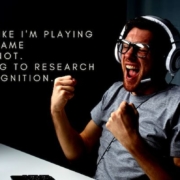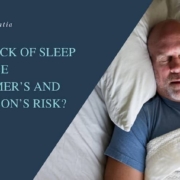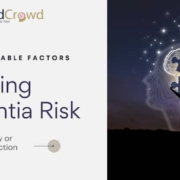Lockdown Brain Fog: Social Isolation Effects on Memory
How is our brain reacting to the extended COVID lockdown? Is social isolation affecting our memory and will this damage be reversible?
What will the effects of perceived social isolation be on memory? Will it affect our brain functions and what can we do about it? Many of us are experiencing more forgetfulness episodes. Some believe they are experiencing a loss of memory, an inability to focus due to stress and anxiety.
The human brain is one of the most complex things in the known universe. A fatty mass containing 86 billion neurons connected by 100 trillion synapses. How is our brain reacting to the extended COVID lockdown?
How much of this brain fog is due to the stress of lockdown and feelings of loneliness? Are we at increased risk of dementia or cognitive decline? Is it really affecting our memory and will this damage be reversible? If so, how can we help our brains?
Difference between Social Isolation and Social Distancing
Social distancing is critical during the pandemic. Always protect yourself and others by observing physical distancing guidelines, but do not let this slip into social isolation.
Lockdowns are indeed beneficial in decreasing coronavirus spread. Therefore, we should acknowledge that the lockdowns and social distancing have proven to be useful and have aided in the worldwide control of COVID. However, even good things can have bad side effects.
Self-isolation or social isolation has a negative effect on the brain. It’s important to clarify that when we mention the effects of social isolation in this article, we are referring to the feelings of perceived loneliness some experience during the pandemic.
Coronavirus Lockdown: Is it Affecting your Brain?
People have concerns about their memory. Especially during pandemic times with less social interactions due to physical distancing and lockdown. And they question if this is cognitive impairment or being sick with COVID or something else.

The majority of the changes that people are noticing, and this includes older adults and young people in their 30s and 40s, are changes in their behavior, memory and thinking patterns. And these changes are likely related to the prolonged stress of being under these conditions of staying at home and having much less socialization than normal.
Social isolation and loneliness is stressful for short periods of time. And I would hazard to say that we don’t have much experience about the health issues that arise from long lasting stay at home periods experienced due to the COVID-related lockdowns.
This is not as extreme but very much like being a prisoner in solitary confinement. But it is similar to what’s experienced by people who are placed into isolation when before they were free to do whatever they wanted.
Even when people go out to the supermarket, they may be afraid when others get close to them. It’s stressful. Some people might have enjoyed shopping in the past. Now, it’s no longer enjoyable because it has become a high stress activity. Everything seems to be high stress nowadays.
Social isolation is not good for your brain or for your body.
You can make a difference.
Help us find out how to extend quality of life by keeping our memory + cognitive abilities for life.
Social Isolation Effects: Will Your Memory Recover?
Long-term stay at home periods are something new for modern science. And we will eventually discover any lasting effects of this lockdown.
Different countries have different approaches to lockdown. Consider the United States and compare it to a place like New Zealand.
New Zealand has been open as it has had zero COVID cases for many months. So, New Zealanders are under much less stress than Americans. Even though the virus is out there in the world, New Zealand is safer and less taxing compared to other places.
The general scientific consensus is that the changes to our behaviors have resulted in higher levels of stress that have been prolonged. We know that high levels of stress are bad for your body and for your brain. With regards to the brain, it can affect learning, memory, thinking, and behavior.
However, the COVID social distancing and stay at home measures are temporary. When our lives go back to normal, we expect mostly everyone’s cognition to recover.
Your Brain in Quarantine: How does Stress Affect our Brains?
The brain can be affected by stress on the vascular system, the endocrine system or the immune system. It could be caused by different things depending on how individuals respond to stress. This makes it very difficult to study since each person’s response can be unique.
Higher levels of stress typically mean higher levels of stress hormones. Be it those directly associated with stress like cortisol, or neurotransmitters like dopamine and serotonin which play key roles in brain function and your mood. These are chemicals that normally our body keeps in balance.
And it’s ok if you have a stressful couple of hours. Some people might get stressed when they have to give a public speech. Their heart races, they sweat a little bit. That’s a good stress response that’s getting them ready for the event.
But stress levels normally rise and go away. Our stress response is meant to be beneficial but when it is prolonged it can have negative effects.
It could be a cascade effect. Stress on your body hurts your blood vessels and that in turn hurts your memory. Or it could be direct. These stress-related chemicals could be directly hurting a region of your brain that affects your memory.
So how this works is very complicated. But there is plenty of evidence that we can recover from the effects of stress on our brain.
3 Ways To De-Stress your Brain When Feeling Socially Isolated
There are some simple things you can do to help your brain during these stressful times. Most of what we would recommend to lower stress in non-COVID times are exercise, visiting your friends, socializing, etc.
But we have to have other options and people should explore them.
- Meditation, mindfulness, yoga, repetitive breathing. These are legitimate ways to manage your stress.
- If you don’t like meditation, get outside of your house. Sit under the sun, go to your backyard, feel the earth beneath your feet. Adding in some outdoor exercise would be great, but you don’t have to work up a sweat to experience the benefits of being outside.
- Most importantly, make sure you’re taking time for yourself. Do something that is only for you. Not you serving your family, not you serving your boss. Take time to do something that you know is for you.
Those will be my three recommendations to de-stress your brain during these stay at home times.
Socializing remains important but it looks different in lockdown. Be creative. Keep in touch with loved ones via phone, video, letter writing or share a meal over Zoom. Avoid loneliness.
Hobbies also remain very important and this usually falls under the category of taking time for yourself that I mentioned above.

Working from Home?
Some people may be used to working from home to some extent. Their job has facilitated them working from home from the start. But that’s not normal for many people who are now working from home and haven’t learned how to build boundaries. Try to set up clear “work” and “work-free” spaces in your home.
And even those who are used to working from home have struggled with the lack of social connections. No matter how sporadic they used to be. So, take time to do something for yourself every day that’s fully for you.
How to Avoid Lockdown Brain Fog: Summary
Get outside any way you want to. If it’s exercise, great. If it’s just sitting in the backyard, great. If it’s feeling the grass under your feet or watching people walk their dogs, great. Get outside of your home.
There are legitimate benefits to feeling that change in temperature and letting that sun beat down on you and experiencing those sensations.
So those would be my three simple things you can do to de-stress your brain under lockdown and social isolation. Mindfulness, yoga, meditation, step outside – even a balcony will do – feel the climate outside of your house. Because we’re not meant to be in this controlled environment for so long.
Matt Huentelman, Ph.D.. Neuroscientist & Human genetics researcher
And try to go back to some of the things you used to do. Wear different outfits. Do those things you don’t actually need to do but used to do and go back to some kind of reality.
FIND OUT MORE ABOUT YOUR BRAIN.
Discover how it compares with others like you in 10 short minutes by playing the free online MindCrowd memory game.
And help scientists find new ways to protect our brains from memory loss as we age.
Stay Tuned for News about Brain Aging and How to Avoid Cognitive Decline.
Matt Huentelman is a neuroscientist and a human genetics researcher. His laboratory studies how the brain ages and explores various ways in which we can prevent brain aging and protect against diseases of the aging brain like Alzheimer’s disease. His lab is based at TGen in Phoenix, Arizona, and he is also the lead scientist for the MindCrowd project.
MindCrowd is an internet based study of the brain that anyone 18 years of age or older can join and it can be found at mindcrowd.org


 MindCrowd
MindCrowd





Leave a Reply
Want to join the discussion?Feel free to contribute!